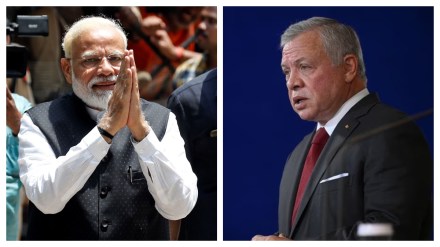Indian Prime Minister Narendra Modi engaged in a meaningful conversation with Jordan’s King Abdullah-II, addressing the grim backdrop of the Israel-Hamas conflict. Both leaders shared their serious concerns regarding the ongoing issues of terrorism, violence, and the tragic loss of innocent civilian lives.
He said on X that concerted efforts are needed for an early resolution of the security and humanitarian situation and underlined their collective apprehensions about the scourge of terrorism, the continuous cycle of violence, and the heart-wrenching toll it has taken on civilians. This, he expressed, necessitates a united endeavor to restore security and address the pressing humanitarian crisis.
Shortly after the telephonic conversation, the Jordanian foreign ministry issued a statement detailing the discussions between the two leaders, highlighting their shared commitment to quell the escalating crisis in Gaza.
India’s resolute stance is in favor of collaborative international efforts to terminate the hostilities in Gaza, ensuring the safety of civilians and medical facilities. Moreover, they stress the vital importance of sustained deliveries of medical and relief aid to the embattled region. King Abdullah-II, during the conversation, voiced his concerns about the rapidly deteriorating humanitarian situation in Gaza, underscoring the far-reaching consequences of this conflict on the entire region and the world.
Situation on the ground
The backdrop to these diplomatic conversations is the ongoing conflict in the Gaza Strip, where Israel initiated a military operation in response to attacks carried out by militants affiliated with Hamas. This conflict, now in its seventeenth day, stands as the deadliest confrontation in the sequence of five Gaza wars, taking a devastating toll on both sides. As of Monday, the Hamas-run Health Ministry reported over 5,000 Palestinians killed and more than 15,000 injured.
Meanwhile, the United Nations has sounded the alarm, emphasizing the urgent need for fuel supply in the besieged Gaza Strip, placing it on par with the necessities of water and food. UN Relief Works Agency (UNRWA) Communications Director Tamara Alrifai, speaking to CNN, highlighted the dire circumstances in Gaza. She articulated the critical role of fuel, enabling transportation, powering water desalination plants, and sustaining hospitals and life-saving medical equipment.
Alrifai also emphasized that the humanitarian aid entering Gaza, though crucial, remains a fraction of what is required to support the over 400,000 displaced individuals’ currently taking refuge in UNRWA-administered schools. The situation, she noted, is extremely dire, with people in Gaza resorting to rationing their food supplies, even counting calories to ensure minimum sustenance.
She concluded by stating the imperative need for continuous, unimpeded access to Gaza, a sentiment in contrast to Israel’s previous stance, where they restricted fuel supplies to the region.
The weekend witnessed intensified Israeli airstrikes on Gaza, amplifying the humanitarian crisis. Reports from doctors on the ground describe catastrophic conditions at central hospitals where electricity and fuel have run dry, and medical facilities are overwhelmed by casualties.
In a glimmer of hope, the Rafah crossing connecting Egypt to Gaza briefly opened over the weekend, allowing the delivery of much-needed aid via 20 trucks on October 21, followed by another 14 trucks making their way into the besieged Gaza. However, the challenges ahead remain daunting.
This diplomatic exchange between India and Jordan serves as a reminder of the collective responsibility of the international community to address the pressing humanitarian crisis in Gaza and work towards a resolution that ensures the safety and well-being of civilians in the region.
